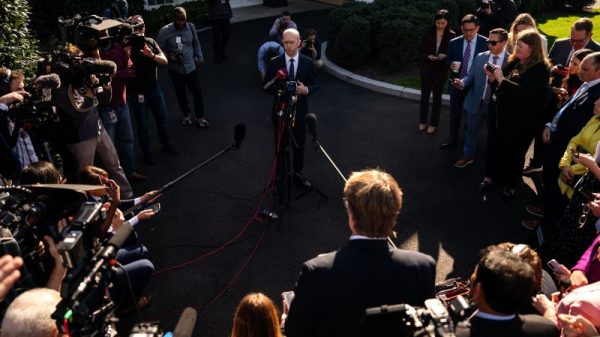Preliminary Iowa Republican caucus entrance polls on Monday highlighted the grip former president Donald Trump maintains on Republican voters and the extent to which his false claims that the 2020 election was rigged have dominated the GOP electorate.
Nearly two-thirds of Iowa caucus-goers said President Biden did not legitimately win the election in 2020, according to results from network entrance polls conducted by Edison Research.
Those numbers come as Trump has made false claims surrounding the 2020 election a key part of his stump speech and his bid for a return to the White House. During a campaign event in Indianola, Iowa, this weekend ahead of his caucus victory Monday night, Trump declared that “radical-left Democrats rigged the presidential election of 2020, and we are not going to allow them to rig the presidential election of 2024.”
There is no evidence of widespread voter fraud in the 2020 election, and challenges to myriad election-related issues have been repudiated more than 60 times in court.
Since 2020, Trump has routinely claimed that Biden did not win the election or that the election was rigged. Weeks after his loss, Trump supporters stormed the U.S. Capitol on Jan. 6, 2021, in an effort to halt the final counting of the electoral college votes confirming Biden’s win. Trump’s actions related to Jan. 6 and his efforts to overturn the election are now the focus of a federal investigation. Trump has been indicted in that case — as well as three other criminal cases since leaving office — and now faces a total of 91 counts.
According to the entrance poll results, of the voters who did not believe Biden won the election, about 7 in 10 supported Trump. About 2 in 10 supported Florida Gov. Ron DeSantis. On the flip side, of the voters who believed Biden won the 2020 election, the majority backed former U.N. ambassador Nikki Haley, followed by DeSantis and Trump.
Both Haley and DeSantis have said that Trump lost the 2020 election.
Trump’s legal issues don’t appear to be damaging his standing among Republican primary voters. The entrance polls also revealed the extensive loyalty Trump has among the GOP base in Iowa. The poll found that about two-thirds of Iowa Republican voters would still consider Trump fit to be president even if he were convicted of a crime, while about a third said he would no longer be fit to be president. That number holds significance given the overlap between Trump’s court dates and his campaign schedule. While some of his rivals have privately hoped that a conviction would stop what seems like a glide path to the GOP presidential nomination, the entrance poll data shows that assessment could be flawed.
Trump has used the indictments to paint himself as a victim of a weaponized legal system that he says is seeking to prevent him from returning to the White House. Special counsel Jack Smith and Attorney General Merrick Garland have said that the charging decisions made by Smith were made independently of the White House and in accordance with Justice Department rules on special counsels.
Trump often calls his indictments a “badge of honor” and tells his supporters: “I’m being indicted for you.” Interviews with GOP voters and polling data suggest that the indictments have only solidified Trump’s support within his party, though it’s unclear how that message may land in a general election.
The entrance polls from Monday night found that Trump won about 7 in 10 of those caucus-goers who said he would still be fit to serve even if he were convicted. Of the roughly one-third who felt Trump would not be fit for office if convicted of a crime, about half backed Haley.
Haley has made the pitch that she is the candidate most likely to win a general election against Biden and has said that “chaos follows” Trump.
Emily Guskin, Scott Clement and Perry Stein contributed to this report.




























